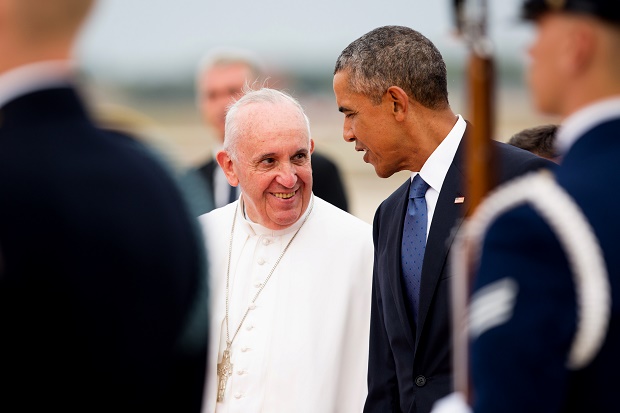-

-
Pope Francis has arrived. His flight landed at Joint Base Andrews (formerly known as Andrews Air Force Base), shortly after 3:30 PM local time in the US state of Maryland.
The welcome ceremony – otherwise little more than a simple observance of only the most absolutely necessary protocol – was punctuated by two particularly poignant elements: the first was the presence of the President of the United States, Barack Obama – and his family – to greet his nation’s guest; the second was the Spanish language alongside English, in which the gathered crowd – some hundreds of young people from Washington, DC area schools among them – cheered their welcome.
President Obama’s presence was remarkable precisely inasmuch as it seemed – it looked and it felt – like a matter of course – and it did. Nevertheless, it is not Standard Operating Procedure for the President to greet a visiting head of state at the airport.
Spanish is Pope Francis’ native tongue, and it is also the language of an already large and still increasing number of immigrants to the United States, whose presence and participation in US society constitutes an accomplished fact: taken together, the election of the first Pope from Latin America and the plain social reality of a significant and growing number of people in the United States who are of Latin American origin, constitute at once proof of the ascendancy of the global south, and incontrovertible evidence of the enduring importance of US leadership on the global stage.
This, at any rate, is one of the interpretative lenses through which the significance of the historic canonization of Bl. Junipero Serra on Wednesday afternoon at the Basilica of the National Shrine of the Immaculate Conception, following Pope Francis’ official White House welcome and his visit with the Catholic bishops of the United States in St. Matthew’s Cathedral, begins for this reporter to come into focus.
Pope Francis’ focus in all this, has always been, and we may fairly expect shall continue to be, primarily pastoral: he is the universal Pastor of the Universal Church; he is here to “strengthen the brethren” and “feed the sheep” and also – no, primarily – to speak to all people of good will about the man in whose stead the Pope stands on earth: Our Lord and Savior, Jesus Christ.
These are neither platitudes, nor by-words, but the elements that explain the theme and motto of this Papal visit to the United States – or rather for the World Meeting of Families in Philadelphia, which is the original reason for and culmination of this Papal visit: “Love is our mission” – our mission. No one is to be excluded, and no one is to be excused from doing his or her part. Pope Francis is here to challenge people, to move people, to get people of every age and state and walk of life out of their comfort zones.
If you look around, and listen, you will find he is already doing it.Source: Vatican Radio





